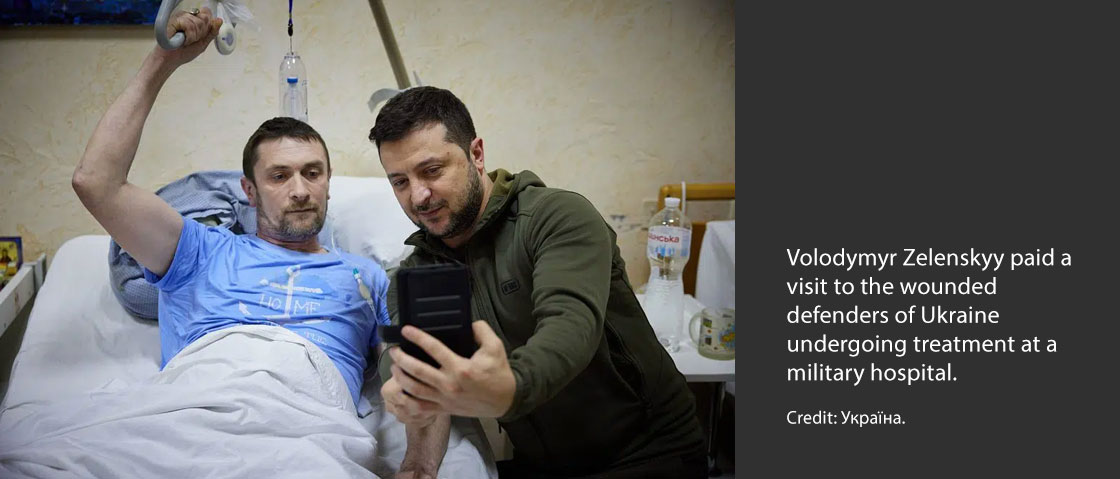Roger Petersen holds BA, MA, and PhD degrees from the University of Chicago. He has taught at MIT since 2001 and is the Arthur and Ruth Sloan Professor of Political Science. Petersen focuses on within-state conflict and violence. He is the author of Resistance and Rebellion: Lessons from Eastern Europe (Cambridge University Press, 2001), Understanding Ethnic Violence: Fear, Hatred, Resentment in Twentieth Century Eastern Europe (Cambridge University Press, 2002), and Western Intervention in the Balkans: The Strategic Use of Emotion in Conflict (Cambridge University Press, 2011). He teaches classes on military intervention, civil war, civil-military relations, and emotions in politics.
This article first appeared in Bulletin of the Atomic Scientists
The war in Ukraine is fought with bullets, bombs, and rockets—and also with images and words. At the center of this conflict, President Volodymyr Zelensky has strategically deployed the latter to trigger emotions among his fellow Ukrainians, Russian foes, and Western supporters.
“Russia has turned the Ukrainian sky into a source of death for thousands of people,” Zelensky, wearing an army-green t-shirt, said in a recent virtual address to the US Congress. Members of Congress were reportedly visibly emotional as they sat, rapt, listening to a speech that referenced Martin Luther King Jr and September 11, 2001: “Is this a lot to ask for, to create a no-fly zone over Ukraine to save people? Is this too much to ask? A humanitarian non-fly zone, so that Russia would not be able to terrorize our free cities?”
Neither the United States nor NATO is likely to establish a no-fly zone over Ukraine—and many would argue that there are good reasons for that. For a no-fly zone to be effective, the West would need to be prepared to shoot down Russian planes that entered the zone. That would present a significant risk of escalating the war between nuclear superpowers. Yet Zelensky has made repeated, emotional calls for a no-fly zone. Why? The answer has everything to do with two powerful emotions—indignation and guilt—known to spur others to act. But if Western policymakers leave their emotions about war unchecked, they may not make the best policy decisions.
Indignation—anger provoked by unjust treatment—requires three actors: an aggressor, a victim, and an observer. In the current crisis, these roles are played by Putin, Ukraine, and the West respectively. Putin (the aggressor) attacked Ukraine (the victim) while the West observed. Indignation cycles are fueled by guilt. Zelensky, in summoning indignation, harnessed the West’s guilt to elicit specific actions by Western policymakers.
“All the people who die from this day forward will also die because of you,” Zelensky said earlier this month in response to NATO’s refusal to consider a no-fly zone.
Throughout, the West has responded with an emotional display of moral outrage. From the West’s point of view, this emotional display signals its virtue to other countries. And this virtue, in turn, enhances its reputation. At the same time, the West also wrote policies—policies that incurred costs—sanctioning Russia.
Every time Zelensky repeats his call for a no-fly zone, the West must repeat its refusal to help those under siege from the sky. With each refusal to help, the indignation cycle repeats. The West experiences more guilt and is spurred to atone for its refusal to support a no-fly zone. In this feedback loop, the West imposes more sanctions or, for example, sends more Javelin missiles.
Zelensky also deploys powerful images, including one that summons an image of what his wartime death might look like: a Jewish president abandoned by the West and Germany in particular. In the process, he does not suggest that Western values are inherently bad. Rather, he calls out the West for its failure to act—and suggests that it can do better.
Violent conflicts like the current war in Ukraine are deeply imbued with emotion. Still, NATO and Western leaders must not be held hostage by emotions while making policy decisions. Policy is not a means for relieving guilt or signaling virtue. Rather, NATO and Western policies should be driven by a pursuit of the West’s and Ukraine’s best interests. The best outcome of this war for both Ukrainians and the West might hail from a negotiated solution in which clear heads, rather than emotions, prevail.




